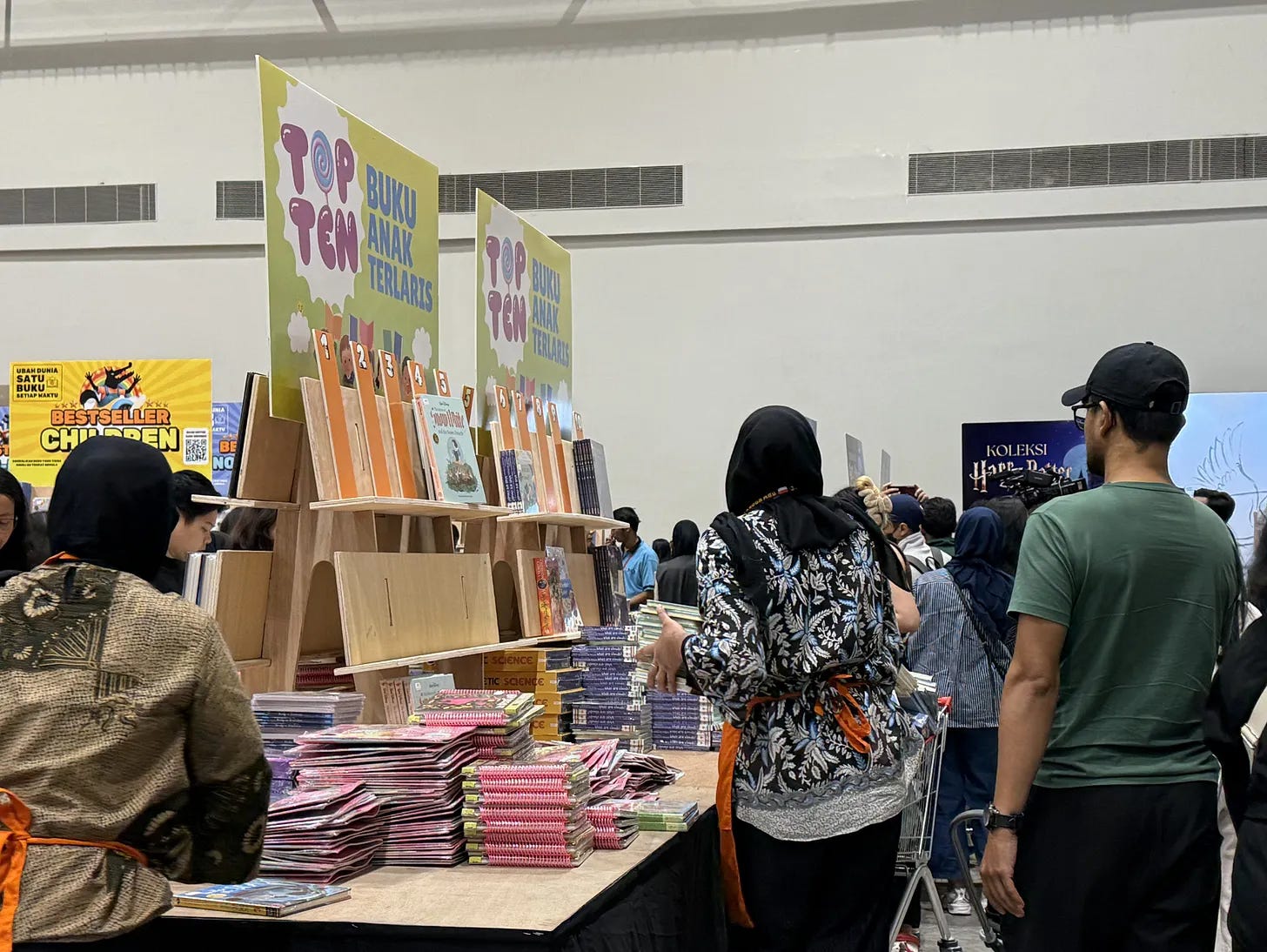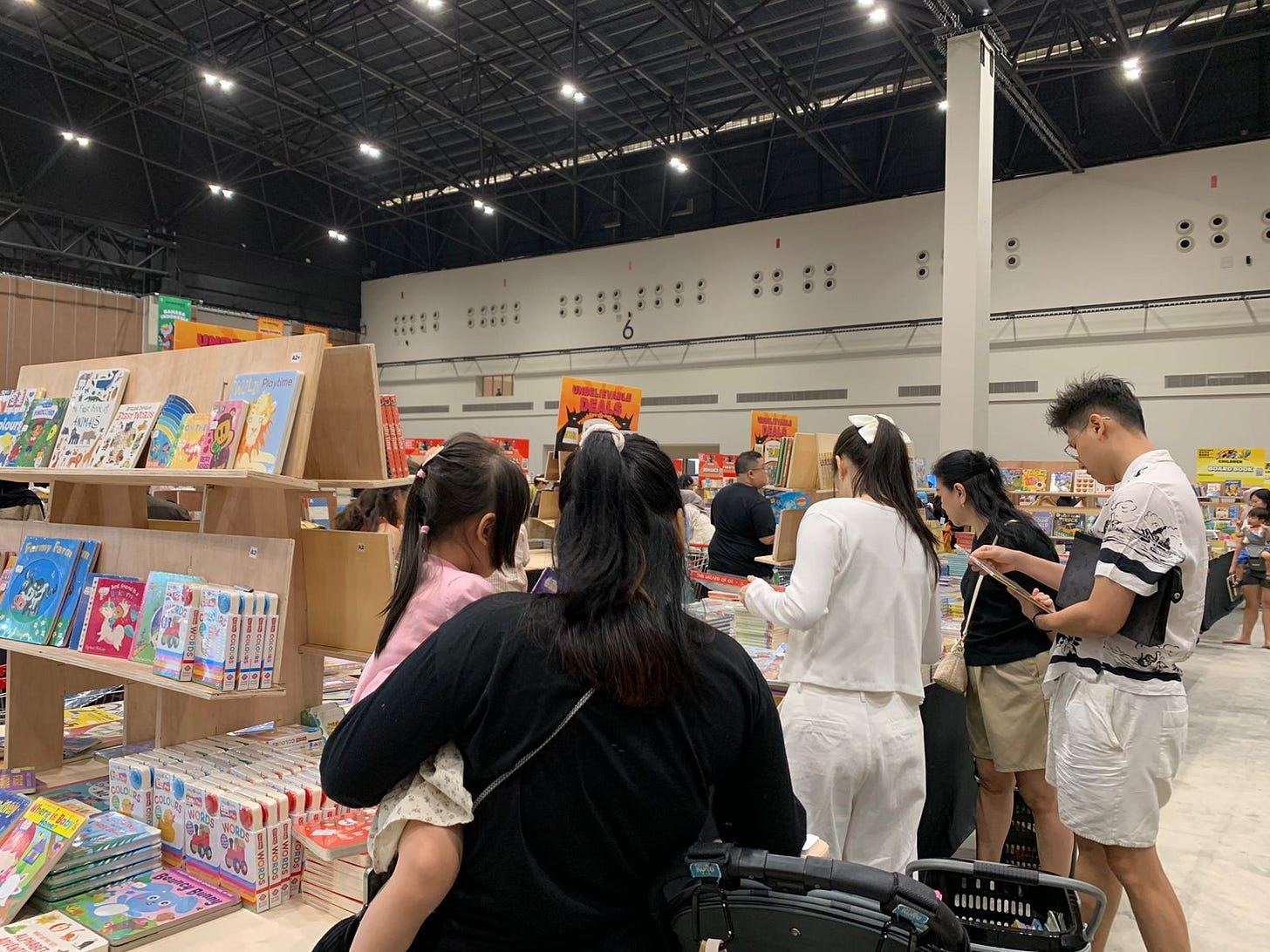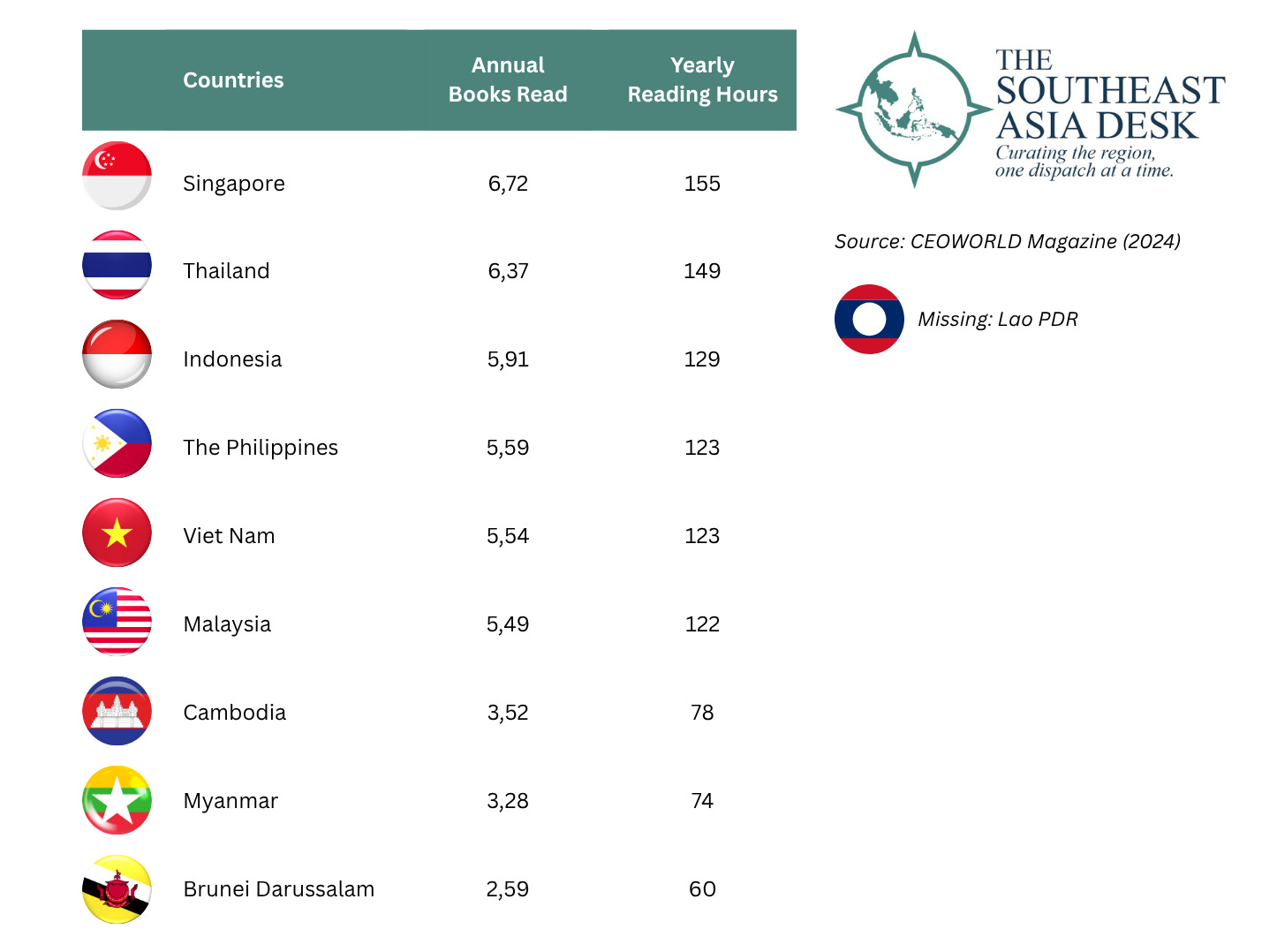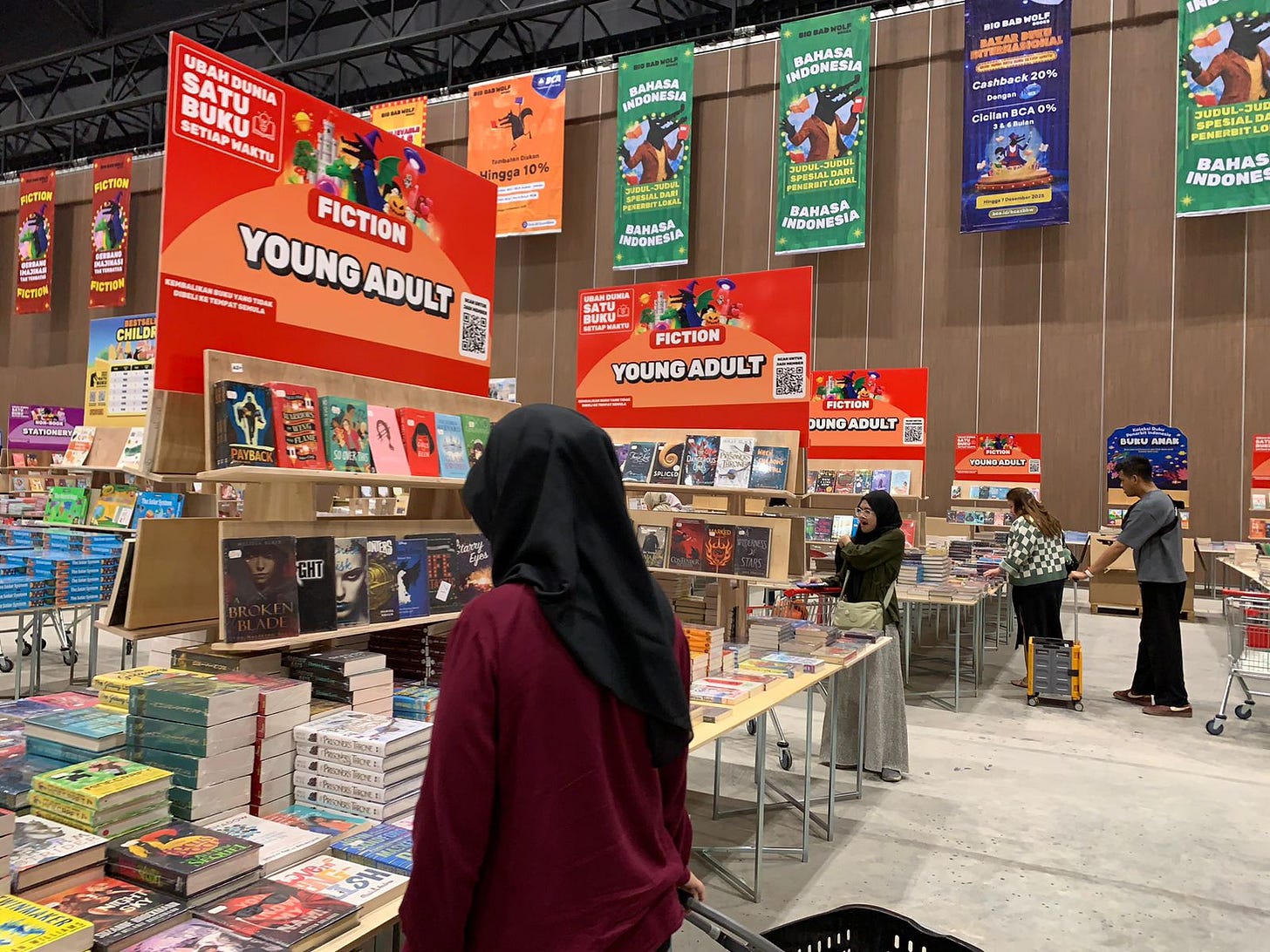📚 Where Does Indonesia Stand in ASEAN’s Reading Map?
Indonesia turns the page on literacy, revealing progress and pause

The Main Takeaway 📖
Southeast Asia’s reading culture tells two stories — one of momentum, one of struggle.
According to CEOWORLD Magazine (2024), Singapore 🇸🇬 and Thailand 🇹🇭 rank among the world’s top readers 📖, while Indonesia and others trail behind.
At home, the National Library’s 2024 Reading Fondness Index placed Indonesia 🇮🇩 at 73.52 points — categorized as moderate, based on data from 174,226 respondents aged 10–69 across all 38 provinces and 514 cities/regencies 🧾.
Why It Matters 🔑
Reading is more than a skill — it’s a social infrastructure that fuels innovation, empathy, and civic participation 💡📚
Research from OECD (2019) and the U.S. National Endowment for the Arts (2007) shows higher literacy is linked to greater civic and cultural participation 📚.
Indonesia’s “moderate” category then signals both progress and plateau: access to education has widened, yet reading habits lag behind 🎓📉
In ASEAN’s race toward the knowledge economy, this gap limits not only learning — but also how ideas move across borders 🌏💬
One Book at a Time 📚
Despite lagging, the story isn’t all bleak. Initiative like Big Bad Wolf (BBW) 🐺 — the world’s largest traveling book sale — are helping reignite curiosity across ASEAN.
Founded by Andrew Yap, BBW 🐺 spans 50 cities in 17 countries, including Malaysia, Indonesia, the Philippines, Singapore, Thailand, Cambodia, and Myanmar 🌏. Its goal is simple yet powerful: to bring the book to the people.
Humans want an escape from digitalization, they want to slow down, and one of the ways is to read books. (Andrew Yap, Founder of Big Bad Wolf Books)
For Yap, the future of reading begins with children 👧🧒 — early exposure to books 📖 sparks a lifelong habit that carries into adulthood, which explains why BBW 🐺 focuses on offering a wide selection of children’s books at every fair.
At the same time, Indonesia’s Country Director Marthius Wandi Budianto says the 2025 fairs — which include Bandung, Palembang, Bali, and Jakarta — will reflect the nation’s growing reading spirit, with 24-hour weekends designed so readers can browse without rushing 🕐.

Why It’s on Our Radar 🔎
BBW’s 🐺 popularity shows Southeast Asia still seeks pages — a region hungry for stories.
BBW’s tour to multiple ASEAN countries creates a shared space for reading 📖 in places still battling low literacy engagement.
It signals untapped potential — that both the region and Indonesia still hold a strong will to read, if given the way 🌏💡.

The Big Picture 📸
Southeast Asia is growing economically 🌏, yet literacy development is uneven; Indonesia’s Reading Fondness Index rose from 66.7 (2023) to 72.44 (2024) ✅, showing progress but still moderate 🎯.
Literacy goes beyond education — it reduces poverty, boosts labor participation, improves health, and empowers women, creating ripple effects across families and communities 🌱.
Regular reading, especially fiction, strengthens empathy, social understanding, and civic participation 🧠🤝 (Kidd & Castano 2013; OECD 2019; NEA), highlighting the social value of turning reading ability into lasting culture.

Why This Hits Home ❤️
At Big Bad Wolf 🐺 events, thousands queue past midnight — not for hype, but for books. That alone speaks volumes.
Indonesia’s readers aren’t disinterested — they’re underserved.
When books are accessible, affordable, and social, people show up. The 24-hour weekend model is proof that curiosity lives quietly, waiting for space to breathe.
What’s at Stake ⚖️
If reading continues to stagnate:
🧠 Critical thinking will erode amid algorithmic media.
💬 Public discourse will thin out.
📉 Human capital will fall behind more literate ASEAN peers.
In a region turning digital-first, literacy remains the foundation for participation — from governance to technology.
The Regional Stakes 🌐
ASEAN’s diversity is also its divide. While Singapore and Thailand strengthen reading culture through digital libraries and civic programs, others — including Indonesia — are catching up.
Through BBW 🐺, books become a form of literary diplomacy — connecting readers across ASEAN 📚🤝
The question isn’t whether Southeast Asians can read — it’s whether they choose to.
Beyond the Headlines 🧭
Across Southeast Asia, literacy is getting a push — from campaigns to school libraries to state programs.
Cambodia 🇰🇭: The Read Louder campaign brings books to remote areas, reaching underserved readers.
Lao PDR 🇱🇦: Room to Read supporting the Ministry of Education, Youth and Sport, using evidence-based curricula to improve literacy, focusing on historically disadvantaged groups.
The Philippines 🇵🇭: Early Childhood Care and Development (ECCD) and National Reading Programs are intensifying to build habits early.
Viet Nam 🇻🇳: The Ministry of Information and Communications celebrates literacy with Discovering the Digital Library for Viet Nam Book and Reading Culture Day and World Book & Copyright Day.
Different methods, shared goal: to make reading a lifestyle — not a task.
The Bottom Line 👉
Indonesia’s literacy story is not one of failure — it’s one of unfinished progress.
And as book fairs like BBW 🐺 turn cities into reading arenas, they remind Southeast Asia that literacy is not only about knowing words — it’s about reclaiming meaning, one book at a time 📖.
Need More Angle? 📰
Badan Pusat Statistik Tingkat Kegemaran Membaca Masyarakat dan Unsur Penyusunnya Menurut Provinsi, 2024
CEOWORLD Magazines Ranked: Countries That Reads The Most Books, 2024
Khmer Times The 3rd annual ‘Read Louder Campaign’ promotes literacy in remote areas
National Endowment for the Arts To Read or Not To Read
Room to Read Laos
Science Xpress Reading Literary Fiction Improves Theory of Mind
The Philippines Department of Education DepEd strengthens commitment to literacy as FLEMMS results show gains, opportunities
The National Library of Vietnam Opening Ceremony of the Book and Reading Culture Day 2024
UNESCO SDG 4 Country Profiles
(CCL/BRZ/VBD)






